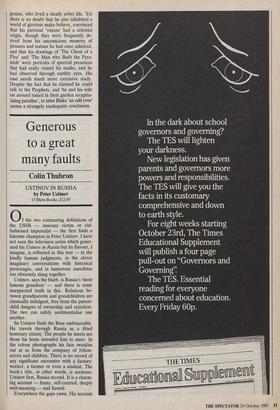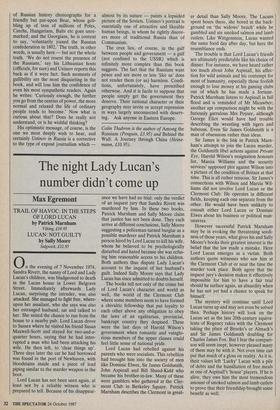Generous to a great many faults
Colin Thubron
USTINOV IN RUSSIA by Peter Ustinov
O'Mara Books, f12.95
0 f the two contrasting definitions of the USSR — insecure victim or old- fashioned imperialist — the first finds a fulsome champion in Peter Ustinov. I have not seen the television series which gener- ated his Ustinov in Russia but its flavour, I imagine, is reflected in this text — in the kindly human judgments, in the clever imaginary conversations with historical personages, and in humorous anecdotes too obviously slung together.
Ustinov, says the blurb, is Russia's 'most famous grandson' — and there is some unexpected truth in this. Relations be- tween grandparents and grandchildren are classically indulgent, free from the parent- child dangers of ownership and rejection. The two can safely sentimentalise one another.
So Ustinov finds the Bear embraceable. He travels through Russia as a fated honorary citizen. The people he meets are those his hosts intended him to meet. In the colour photographs his face twinkles out at us from the company of fellow- actors and children. There is no record of any significant encounter with a factory- worker, a farmer or even a student. The book's title, in other words, is accurate: Ustinov first, Russia second. It is a charm- ing account — funny, self-centred, deeply well-meaning — and flawed.
Everywhere the gaps yawn. His account of Russian history choreographs for a friendly but put-upon Bear, whose gob- bling up of tens of millions of Poles, Czechs, Hungarians, Balts etc goes unre- marked; and the Georgians, he is content to say, 'voluntarily joined the Russian confederation in 1802.' The truth, in other words, is usually here — but not the whole truth. 'We do not resent the presence of the Russians,' say his Lithuanian hosts (officials, for sure) and Ustinov reports this back as if it were fact. Such moments of gullibility are the most disquieting in the book, and will lose him the confidence of even his most sympathetic readers. Again he writes: 'Curiously enough, the further you go from the centres of power, the more normal and relaxed the life of ordinary people tends to become.' Now what is curious about that? Does he really not understand, or is he wishful thinking?
His optimistic message, of course, is the one we most deeply wish to hear, and certainly Ustinov in Russia is a corrective to the type of exposé journalism which — almost by its nature — paints a lopsided picture of the Soviets. Ustinov's portrait is essentially one of attractive and likeable human beings, in whom he rightly discov- ers more of traditional Russia than of Communism.
The crux lies, of course, in the gulf between people and government — a gulf (not confined to the USSR) which is infinitely more complex than this book suggests. The fact that the Russians want peace and are more or less 'like us' does not render them (or us) harmless. Condi- tions, unfortunately, have prescribed otherwise. And it is facile to suppose that people simply get the government they deserve. Their national character or their geography may invite or accept repression in ways largely unconnected with deserv- ing. Ask anyone in Eastern Europe.
Colin Thubron is the author of Among the Russians (Penguin, f3.95) and Behind the Wall: A Journey through China (Heine- mann, f10.95).



















































 Previous page
Previous page